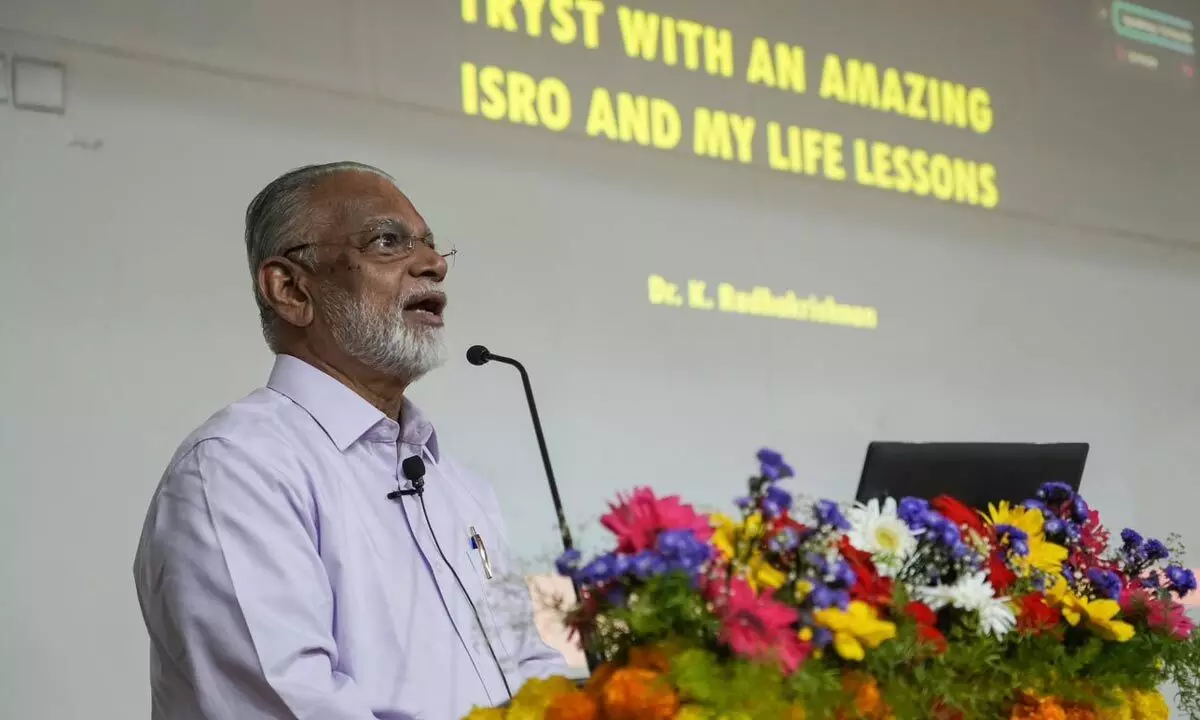Live
- Sarathi Portal under maintenance
- Kadapa: SP Siddarth Kaushal inspects strongroom
- Special officers to oversee EVMs’ security
- Kid suffocates to death, parents forget her in car
- Yogi rightly used swachhata abhiyan on crime says PM Modi
- Will Vemireddy Prashanthi break Nallapareddy’s winning streak in Kovur?
- KIMS Saveera performs brain surgery on 7-month-old baby
- TTD chief presents ‘sare’ to Gangamma
- VPA achieves another feat in cargo handling
- Guntur: Officers told to make arrangements for counting of votes
Just In
IITH establishes an 'Advanced Darksky Observatory' for multidisciplinary research


IITH establishes an 'Advanced Darksky Observatory' for multidisciplinary research
Department of Physics, IIT Hyderabad (IITH, celebrated National Science Day with the theme 'Global Science for Global Wellbeing'.
Department of Physics, IIT Hyderabad (IITH, celebrated National Science Day with the theme 'Global Science for Global Wellbeing'. Dr K Radhakrishnan (Recipient of Padma Bhushan), Distinguished Advisor in the Department of Space and Former Chairman of ISRO, attended as the chief guest of the program. He delivered a reflective talk on 'Tryst with an amazing ISRO and my life lessons'. Prof P Panigrahi, director, IISER, Kolkata, had also delivered a popular talk on 'Emergence of quantum science and technology in the 21st century'.
As a part of the National Science Day celebration event, an 'Advanced Darksky Observatory' (ADO) was established inside the campus and was inaugurated today by Dr K Radhakrishnan in the august presence of Prof BS Murty, Director, IITH, Deans, HoD, Faculty, Staff & Students of IITH. The project is funded by IITH. ADO will host a 0.5-meter Robotic optical telescope (largest among small telescope categories) which will have a magnification of ~1000x, capabilities of resolving a structure as small as 25 km on the surface of the moon, individual rings of Saturn, detecting active galaxies up to a distance of 1.5 Giga light-years (1419 billion kilometers). Primarily designed as a frontier research facility in Astronomy, ADO, with adaptive imaging and multi-filter spectroscopy, will deliver imaging and spectroscopic data banks, which will be valuable assets for research and modern teaching. Due to its upcoming full robotic capabilities, the observatory will be capable of integrating into the global telescope network system like NASA's Global Telescope Network (GTN) for urgent alerts to the scientific communities on transient celestial events, asteroids and meteorites. It will also complement ISRO's current and future space-based astronomical observatories.
Stating the importance of such an observatory, Dr Radhakrishnan added, "It is wonderful robotic telescope that you have built here. If all Engineering Science capabilities of this institute are put together to build a new breed of instrumentation for space exploration, then you will be a major contributor."
Applauding the efforts of the Department of Physics, Prof BS Murty, Director, IITH, said, "We should learn from Dr Radhakrishnan to dream passionately. It is always exciting for anyone to know about the stars, their existence, and many other queries and dilemmas; one of the options helpful in this scenario is a Telescope. At IITH, we have set up a 14 Inch Telescope under a special ADO, which can give us a vision of minor details in the space so that one can be able to learn more about them, ensure that the knowledge about the space, in general, get enhanced, and we can attain Atmanirbharta."
"Here, we have one of the advanced observation facilities which will seed not only astronomical research but also research in data science and management, machine learning, as well as, robotics. With these advanced facilities, we will provide young students with an opportunity to study stellar objects in greater detail and discover new celestial objects, including exosolar planets. ADO will also be a part of the international astronomical community and complement the space-based astronomical mission", added Dr Mayukh Pahari, Assistant Professor, Department of Physics.

© 2024 Hyderabad Media House Limited/The Hans India. All rights reserved. Powered by hocalwire.com






